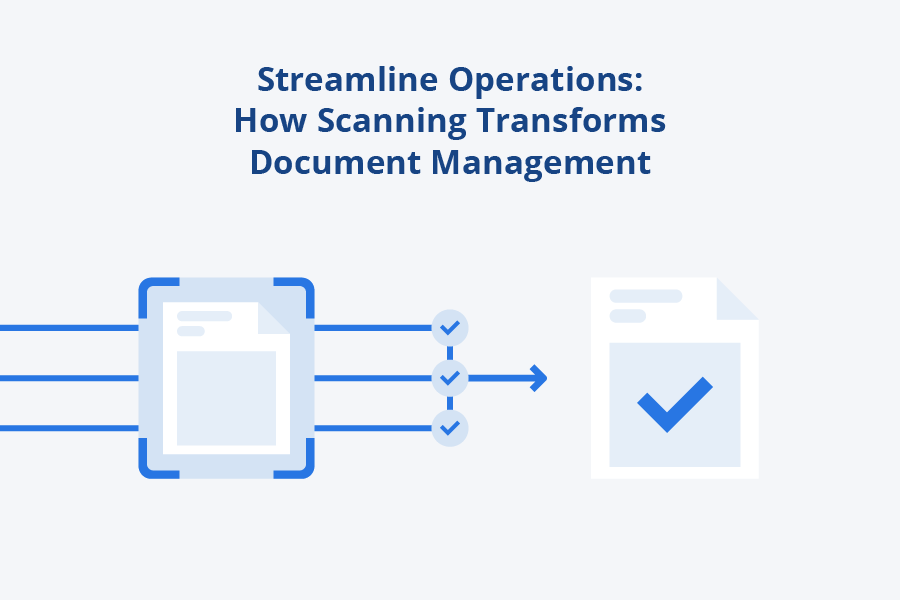Streamline Operations: How Scanning Transforms Document Management

Efficient document management is critical for maintaining productivity, ensuring compliance, and fostering collaboration in a fast-evolving business environment. Yet, many organizations still rely on traditional paper-based systems, which can be cumbersome, error-prone, and costly. By embracing scanning technology, businesses can unlock a transformative approach to managing documents, resulting in streamlined operations and enhanced efficiency.
 The Challenges of Paper-Based Systems
The Challenges of Paper-Based Systems
Paper-based document management comes with a host of challenges. Storing physical files requires significant space and can lead to escalating storage costs over time. Retrieving information from paper files is often a time-consuming process, especially if documents are misfiled or stored offsite. Furthermore, physical documents are vulnerable to damage, theft, and loss, posing risks to data security and regulatory compliance.
Manual processes also limit collaboration and accessibility. In a world where remote work is increasingly common, reliance on paper records can hinder teams’ ability to access critical information when they need it most. These inefficiencies can ultimately impact decision-making and customer service.
 The Scanning Advantage
The Scanning Advantage
Document scanning offers a powerful solution to these challenges, converting physical records into digital formats that are easy to store, retrieve, and share. Here’s how scanning can transform your document management practices:
-
Improved Accessibility: Digital documents are accessible anytime, anywhere. Scanning enables organizations to centralize their records in secure, cloud-based repositories, ensuring employees can quickly retrieve the information they need. This level of accessibility is especially valuable for remote and hybrid work environments.
-
Enhanced Security: Digital files can be encrypted, password-protected, and backed up, providing layers of security that physical documents cannot match. In addition, access controls can be implemented to ensure only authorized personnel can view sensitive information, helping organizations meet stringent compliance requirements.
-
Cost Savings: By reducing the need for physical storage and minimizing manual labor associated with paper handling, businesses can achieve significant cost savings. Digitization also streamlines workflows, allowing employees to focus on higher-value tasks instead of sifting through paper files.
-
Eco-Friendly Operations: Scanning and digitization contribute to sustainability by reducing paper consumption and the environmental impact of physical storage. Adopting digital document management aligns with corporate social responsibility goals and appeals to environmentally conscious stakeholders.
-
Efficient Retrieval and Workflow Automation: With scanning technology, indexed and searchable digital files can be located in seconds. Advanced Optical Character Recognition (OCR) tools further enhance searchability, making it easy to extract information from scanned documents. Additionally, digital files can be integrated into workflow automation systems, reducing bottlenecks and improving process efficiency.
 Best Practices for Implementing Scanning Solutions
Best Practices for Implementing Scanning Solutions
Transitioning to a digital document management system requires careful planning. Here are some best practices to ensure a successful implementation:
-
Assess Your Needs: Begin with an audit of your current document management processes to identify pain points and opportunities for improvement.
-
Prioritize Document Types: Determine which documents should be digitized first based on their importance, frequency of use, and regulatory requirements.
-
Train Your Team: Provide training to ensure employees are comfortable with new digital systems used to manage the documents.
-
Partner Strategically: Consider collaborating with experienced service providers to ensure a smooth transition and access to specialized expertise.
 The Future of Document Management
The Future of Document Management
As organizations continue to embrace digital transformation, the role of scanning in document management will only grow in importance. By digitizing records and integrating them into modern systems, businesses can stay competitive, agile, and prepared for the challenges of tomorrow.
Incorporating digital transformation projects into your operations is more than just a technological upgrade; it’s a strategic move toward efficiency, security, and sustainability. For organizations looking to future-proof their processes, the time to digitize is now.
Octacom is a SOC 2, Type II Audited enterprise software and services company focused on document and data automation solutions, including automated data capture. Founded in 1976, Octacom specializes in accounts payable automation and automated invoice processing, among other digital / automated business process outsourcing services.
If your organization is looking to learn more about our solutions and services, please contact us and we would be glad to help.
